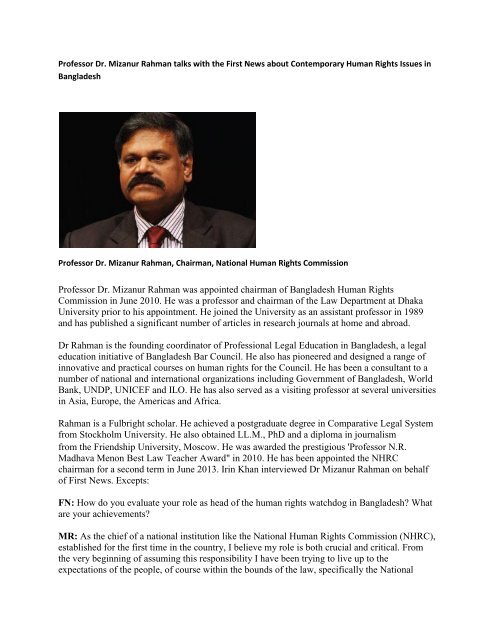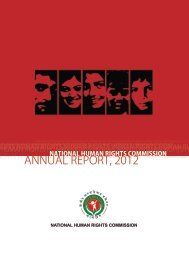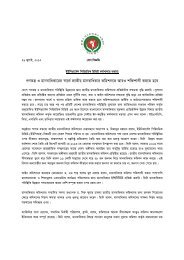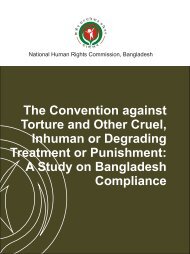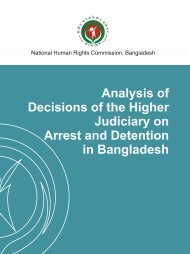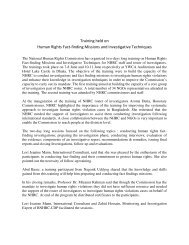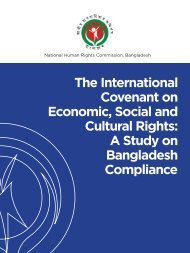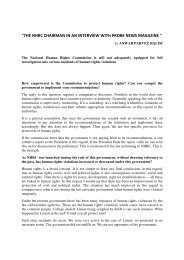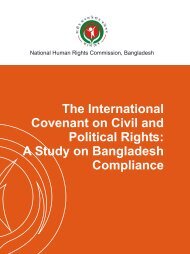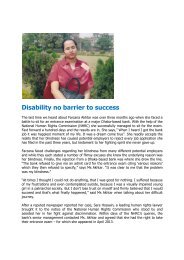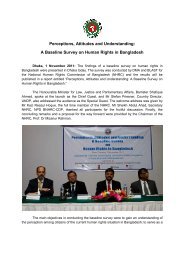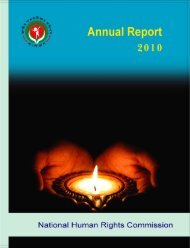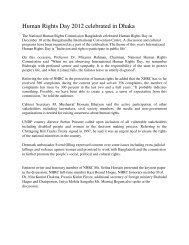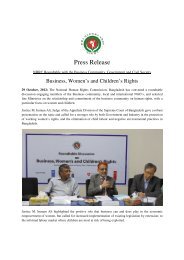Professor Dr. Mizanur Rahman talks with the First News about ...
Professor Dr. Mizanur Rahman talks with the First News about ...
Professor Dr. Mizanur Rahman talks with the First News about ...
Create successful ePaper yourself
Turn your PDF publications into a flip-book with our unique Google optimized e-Paper software.
<strong>Professor</strong> <strong>Dr</strong>. <strong>Mizanur</strong> <strong>Rahman</strong> <strong>talks</strong> <strong>with</strong> <strong>the</strong> <strong>First</strong> <strong>News</strong> <strong>about</strong> Contemporary Human Rights Issues in<br />
Bangladesh<br />
<strong>Professor</strong> <strong>Dr</strong>. <strong>Mizanur</strong> <strong>Rahman</strong>, Chairman, National Human Rights Commission<br />
<strong>Professor</strong> <strong>Dr</strong>. <strong>Mizanur</strong> <strong>Rahman</strong> was appointed chairman of Bangladesh Human Rights<br />
Commission in June 2010. He was a professor and chairman of <strong>the</strong> Law Department at Dhaka<br />
University prior to his appointment. He joined <strong>the</strong> University as an assistant professor in 1989<br />
and has published a significant number of articles in research journals at home and abroad.<br />
<strong>Dr</strong> <strong>Rahman</strong> is <strong>the</strong> founding coordinator of Professional Legal Education in Bangladesh, a legal<br />
education initiative of Bangladesh Bar Council. He also has pioneered and designed a range of<br />
innovative and practical courses on human rights for <strong>the</strong> Council. He has been a consultant to a<br />
number of national and international organizations including Government of Bangladesh, World<br />
Bank, UNDP, UNICEF and ILO. He has also served as a visiting professor at several universities<br />
in Asia, Europe, <strong>the</strong> Americas and Africa.<br />
<strong>Rahman</strong> is a Fulbright scholar. He achieved a postgraduate degree in Comparative Legal System<br />
from Stockholm University. He also obtained LL.M., PhD and a diploma in journalism<br />
from <strong>the</strong> Friendship University, Moscow. He was awarded <strong>the</strong> prestigious '<strong>Professor</strong> N.R.<br />
Madhava Menon Best Law Teacher Award" in 2010. He has been appointed <strong>the</strong> NHRC<br />
chairman for a second term in June 2013. Irin Khan interviewed <strong>Dr</strong> <strong>Mizanur</strong> <strong>Rahman</strong> on behalf<br />
of <strong>First</strong> <strong>News</strong>. Excepts:<br />
FN: How do you evaluate your role as head of <strong>the</strong> human rights watchdog in Bangladesh? What<br />
are your achievements?<br />
MR: As <strong>the</strong> chief of a national institution like <strong>the</strong> National Human Rights Commission (NHRC),<br />
established for <strong>the</strong> first time in <strong>the</strong> country, I believe my role is both crucial and critical. From<br />
<strong>the</strong> very beginning of assuming this responsibility I have been trying to live up to <strong>the</strong><br />
expectations of <strong>the</strong> people, of course <strong>with</strong>in <strong>the</strong> bounds of <strong>the</strong> law, specifically <strong>the</strong> National
Human Rights Act 2009. In that sense I would say NHRC has been able to bring at least a visible<br />
change in <strong>the</strong> human rights culture in <strong>the</strong> country. We probably should have done more <strong>with</strong><br />
regards to forced disappearances and extrajudicial killings. But those kinds of issue need political<br />
and national commitments. NHRC alone cannot address <strong>the</strong>se human rights challenges no matter<br />
how hard and honestly it may try. If you go through our strategic plan for 2010-2015, extra<br />
judicial killing and forced disappearances, in o<strong>the</strong>r words, violations by <strong>the</strong> state actors and <strong>the</strong><br />
state mechanism, have been identified as one of <strong>the</strong> key concern areas requiring NHRC<br />
intervention. However, I would like to say that our effective intervention so far has visibly<br />
reduced <strong>the</strong> number of extra judicial killings compared to <strong>the</strong> previous years. Forced<br />
disappearances still remain an alarming subject. We are putting our efforts to address this<br />
problem.<br />
FN: How independent is <strong>the</strong> Human Rights Commission? How much interference do you get<br />
from <strong>the</strong> government?<br />
MR: It depends on how you look at independence. Unfortunately <strong>the</strong>re is a general perception<br />
that no commission or institution is independent in this country, and I totally disagree. From <strong>the</strong><br />
day one, we have made sure that NHRC is a fully independent state institution and not a<br />
government institution. We are accountable to <strong>the</strong> country via its president. Independence needs<br />
some practical elements. For you to be independent, you need adequate human resources,<br />
financial resources and logistics. There is no denying that we are inadequate when it comes to<br />
fulfilling <strong>the</strong>se requirements. There has not been a single instance of government interference in<br />
NHRC—not a single call from a minister, government officials or prime minister's office.<br />
FN: You have been recently criticized over <strong>the</strong> Limon issue. How do you defend yourself?<br />
MR: From day one, we, for obvious reasons, sided <strong>with</strong> Limon, demanding <strong>with</strong>drawal of false,<br />
fabricated cases filed against him. We also demanded compensation for <strong>the</strong> loss of his leg, which<br />
he has to bear for <strong>the</strong> rest of his life. So for obvious reasons we were against <strong>the</strong> authorities. It<br />
has been alleged that I have recently asked Limon to <strong>with</strong>draw his case against RAB. That was a<br />
misunderstanding. There was no proposal for compromise from my side. After <strong>the</strong> government<br />
<strong>with</strong>drew cases against Limon, he came to my office and in front of <strong>the</strong> press he did not mention<br />
even for a single time that I had asked him to <strong>with</strong>draw <strong>the</strong> case. The reporters printed <strong>the</strong> story<br />
<strong>with</strong>out even bo<strong>the</strong>ring to check <strong>the</strong> facts <strong>with</strong> me.<br />
FN: Your critics say that your words are seldom followed by actions. Is it true?<br />
MR: The nature of my job entails that my words are also actions. You see, I have to build<br />
awareness of human rights in a society where it is little understood. We did not have a human<br />
rights commission before. It is a new thing. So I have to show emotion to rally people around it.<br />
Emotional commitment is <strong>the</strong> first step to action. I cannot just get things done by asking or<br />
ordering. I have to convince people, and get <strong>the</strong>m imbued <strong>with</strong> <strong>the</strong> right set of values before <strong>the</strong>y<br />
will take human rights issues seriously.<br />
FN: NHRC as a human rights defender and promoter has not taken any steps or issued any<br />
statements on <strong>the</strong> killing of Hefazat-e- Islam activists on May 5. Why?
MR: We must be very cautious in making a distinction between human rights violation and law<br />
and order situation. Law and order situation is something, which is <strong>with</strong>in <strong>the</strong> ambit of <strong>the</strong> law<br />
enforcement agencies of <strong>the</strong> state. If <strong>the</strong> law enforcement actions trespass <strong>the</strong> due process of law<br />
or <strong>the</strong> abuse of authority, <strong>the</strong>n it amounts to human rights violation. Then <strong>the</strong> question is whe<strong>the</strong>r<br />
what happened on May 5 crossed that limit. Even when <strong>the</strong>re was allegation that a good number<br />
of citizens were killed and shot down by <strong>the</strong> law enforcing agencies, we made an appeal that<br />
anyone who thinks his/her relative was shot dead or has gone untraced, should come to us to<br />
lodge a complaint to <strong>the</strong> NHRC so that we can investigate <strong>the</strong> case of human rights violation and<br />
come up <strong>with</strong> <strong>the</strong> findings. Let me state, till today we did not receive a single complaint from a<br />
single citizen alleging his/her relative/friend/ acquaintance has been missing or got killed.<br />
FN: But one NGO named Odhikar has claimed that <strong>the</strong>y have a list of 61 people who were killed<br />
that night?<br />
MR: That is true. They claim <strong>the</strong>re has been 61 deaths but <strong>the</strong>y could not come up <strong>with</strong> even 16<br />
names. They were still digging. So NHRC cannot act upon mere suspicion or hearsay. We must<br />
have concrete evidence or complaint based on which we can act.<br />
FN: Do you believe Hefazat members were killed that night? If yes, do not you believe you had<br />
a role in protesting those killing?<br />
MR: I do not know <strong>the</strong> answer for sure. I have already said it. Right on that day I was in Geneva.<br />
I heard from a Bangladeshi expatriate <strong>the</strong>re that 25,000 people were killed that night. I was<br />
shocked to hear that but <strong>the</strong>n I realized that number had no basis. You see people were<br />
speculating all kinds of numbers but I am yet to see hard evidence. What happened to <strong>the</strong> dead<br />
bodies if so many were killed indeed? And <strong>the</strong> stains of blood flowing from that many bodies<br />
could not be washed that quickly.<br />
FN: Amongst <strong>the</strong> developing countries, Bangladesh has one of <strong>the</strong> most dismal human rights<br />
record. How do you plan to change that impression?<br />
MR: At <strong>the</strong> very outset I would disagree <strong>with</strong> <strong>the</strong> first part of <strong>the</strong> question that human rights<br />
situation is amongst worst in Bangladesh. Probably you are not aware that <strong>the</strong>re are many<br />
countries in <strong>the</strong> world where human rights is far worse than in Bangladesh. For example,<br />
Burundi, Somalia, Ethiopia, Pakistan, Guatemala. I can give you hundred names straightaway. If<br />
we have got issues, we have also got success stories to be proud of. Bangladesh has achieved<br />
tremendous success in improving socioeconomic rights and that success has been acknowledged<br />
internationally of which our reaching MDG goal two years ahead of time is but one example.<br />
NHRC has different groups or cells working on various issues. For example, Child Rights Act<br />
2013 has been enacted. We made a good number of suggestions and recommendations of how it<br />
should be adapted, and developed. And those have been incorporated in <strong>the</strong> new legislation.<br />
FN: Do you have any particular suggestion regarding effective functioning of <strong>the</strong> country's<br />
autonomous commissions so that those can work more effectively for benefit of <strong>the</strong> common<br />
people?
MR: I do not know <strong>about</strong> <strong>the</strong> o<strong>the</strong>r commissions, but NHRC has been functioning and acting<br />
quite independently. But for us to be independent, we need adequate human resources, financial<br />
resources and logistics. Whatever law we have, we can act <strong>with</strong>in those far more effectively if<br />
we have more resources. The o<strong>the</strong>r commissions should know better how to become more<br />
effective. I cannot judge <strong>the</strong>m.<br />
FN: Women and children are particularly vulnerable to human rights violations. We know <strong>the</strong><br />
present laws are not enforced or <strong>the</strong> social condition has not yet given <strong>the</strong> weakest <strong>the</strong><br />
opportunity to get justice. What are your observations and suggestions in this regard?<br />
MR: The poor and <strong>the</strong> weak always pay a greater price for everything. They are <strong>the</strong> hardest hit<br />
segment of <strong>the</strong> population, most vulnerable and marginalized. Keeping this in mind, we have<br />
special cell in NHRC to address issues involving women and children. And <strong>the</strong> cell has been<br />
functioning in collaboration <strong>with</strong> a number of NGOs and international donor agencies. We are<br />
also dealing on women's rights <strong>with</strong> special focus on indigenous women. The challenges are<br />
tremendous. NHRC is only a three-year-old organization, and you cannot expect it to solve all<br />
<strong>the</strong> woes and troubles <strong>with</strong>in such a short time.<br />
FN: Have you done enough to deserve a second term in your position?<br />
MR: Whe<strong>the</strong>r I deserve or not, I have been given a second term. In <strong>the</strong> first term I have built <strong>the</strong><br />
framework of <strong>the</strong> organization and tested some of its policies on <strong>the</strong> ground. I also believe that I<br />
have put NHRC on <strong>the</strong> map of this country. People know <strong>the</strong> organization and <strong>the</strong>y also talk<br />
<strong>about</strong> it; may not do so always in <strong>the</strong> positive sense. The commission has earned trust and<br />
confidence of <strong>the</strong> people. Here people do not have to pay single penny to lodge a complaint or to<br />
get some of our service. Anyone can enter our office anytime during <strong>the</strong> working hours in any<br />
dress. I doubt if any o<strong>the</strong>r commission in <strong>the</strong> country offers such an open-arm privilege to <strong>the</strong><br />
common people.<br />
FN: What do you think <strong>about</strong> <strong>the</strong> present political stalemate? Do you believe <strong>the</strong> country is<br />
heading for a confrontation?<br />
MR: As <strong>the</strong> chairman of <strong>the</strong> NHRC, I cannot comment on <strong>the</strong> political situation. But this country<br />
has a historic legacy of confrontational politics. At least that is what we have seen for last few<br />
decades. We should come out of that confrontation culture and reach national consensus on<br />
certain fundamental issues. One of <strong>the</strong> cardinal issues is respect for human rights. Human rights<br />
is not safe <strong>with</strong>out democracy. Democracy and human rights are two sides of <strong>the</strong> same coin.


